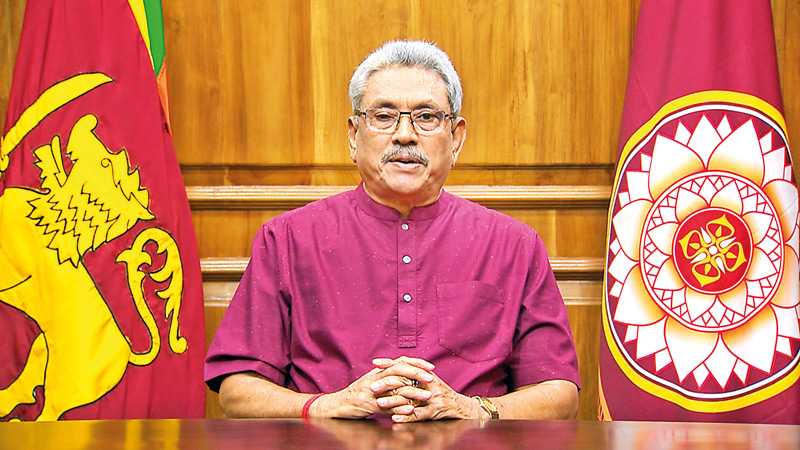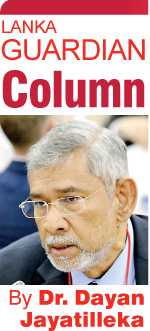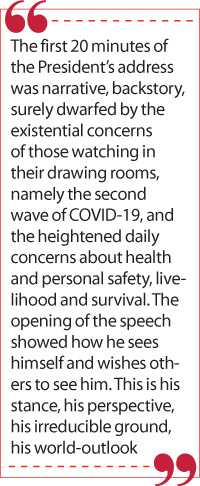Sunday Feb 15, 2026
Sunday Feb 15, 2026
Thursday, 26 November 2020 00:20 - - {{hitsCtrl.values.hits}}

In his address to the nation on 18 November, President Gotabaya Rajapaksa conveyed the impression of being unflinching, implacable
“Today, the rise of an alternative, techno-authoritarian model of governance is the principal threat to the community of democracies” – Anthony Blinken (The Washington Post, 1 January 2019)
 If I may be pardoned for stating the obvious, television, like cinema, is an audio-visual medium, but in your drawing-room. Your consciousness registers the picture you see and the sounds you hear before you’ve processed what’s being said.
If I may be pardoned for stating the obvious, television, like cinema, is an audio-visual medium, but in your drawing-room. Your consciousness registers the picture you see and the sounds you hear before you’ve processed what’s being said.
Watching President Gotabaya Rajapaksa’s address to the nation (18 November) on the first anniversary of his presidency, I was struck by the close-up and the expression throughout. At a moment the country is reeling with the pandemic, his expression was stern, and combined with his body language through the address, conveyed the impression of being unflinching, implacable.
It could not have been Churchillian resoluteness in the face of COVID-19, because President Gotabaya Rajapaksa’s first mention of the pandemic was 19-20 minutes into his speech.
Presidential discourse
The first 20 minutes of the President’s address was narrative, backstory, surely dwarfed by the existential concerns of those watching in their drawing rooms, namely the second wave of COVID-19, and the heightened daily concerns about health and personal safety, livelihood and survival.
The opening of the speech showed how he sees himself and wishes others to see him. This is his stance, his perspective, his irreducible ground, his world-outlook:
“A year ago, more than 6.9 million voters in this country elected me as your new President. It is no secret that the majority who voted for me then were Sinhalese. They rallied because they had legitimate fears that the Sinhala race, our religion, national resources and the heritage would be threatened with destruction in the face of various local and foreign forces and ideologies that support separatism, extremism and terrorism. The main appeal made by the people to me was to ‘protect the country’.”
The invocation of the “Sinhala race” and “our religion” seemed something of an abstraction when the citizenry including the Sinhala people are experiencing suffering and anxiety. The Presidential address did not reflect any sense of the corona-driven crisis.
A few paragraphs after that, i.e. very early in his speech, and preceding any reference to the pandemic, he stated that “I meet with an advisory council comprising leading Buddhist monks of three chapters every month to seek their advice on matters pertaining to governance.”
The next paragraph drew attention to what was presumably a priority strategic threat: “…Historic sacred sites of archaeological value were being encroached by extremists.”
When he finally got around to addressing the second wave of COVID-19, his bottom-line was this: “If all of us adhere to health guidelines and fulfil our respective duties as responsible citizens we can control this new situation in the future in the same manner we handled the first wave of the coronavirus.”
He obviously doesn’t believe that in the case of a President ‘the buck stops here’ as the sign that President Truman had on his desk, read—meaning that he is ultimately responsible and cannot, must not, pass the buck to anyone else.
The first paragraphs/minutes of President Gotabaya Rajapaksa’s address to the nation obviously list those achievements that he thinks are most important, and of which he is proudest: “I have now set up a special Task Force to protect sites of archaeological value and to preserve our Buddhist and national heritage.” This came many minutes—and paragraphs—before he made any reference to the coronavirus pandemic in his speech.
This is who President Gotabaya Rajapaksa is. Take it or leave it. He believes that given demography, the vast bulk of the citizenry will always take it rather than leave it.
There was a clear disconnect between his speech and what is going on in the country; between his sentiments and priorities on the one hand, and the exigencies of the situation and existential concerns of the people on the other.
The entire Government re-tells the fairy-tale. In contrast to Mahinda Rajapaksa as President CBK’s dissident populist Minister, the most noteworthy young SLPP parliamentarian, speaking in the Budget debate and replying the Opposition Leader, claimed that “facing the second wave, the Government’s efforts…are extremely successful”.
But what was the truth about the top performers during the first wave, which provides the causative context of our unpreparedness for the second?
The son of the iconic economist John Kenneth Galbraith, James K. Galbraith, Professor of Government and Chair in Government/Business Relations at the Lyndon B. Johnson School of Public Affairs at the University of Texas at Austin, said in a recent interview that:
“…A range of governments – including New Zealand, South Korea, Vietnam, Singapore, Cuba, and Taiwan – reacted to the news about the initial outbreak in Wuhan, China, in early January, in most cases mobilising existing state structures, such as special ministry-level task forces. China itself was only a few weeks behind, and when it mobilised, it did so forcefully, essentially eliminating the virus within a few months. A few European countries – notably Slovakia and Greece – also had a strong initial response…” (Defend Democracy Press, 17 November)
 Presidential conscience
Presidential conscience
President Rajapaksa declared towards the end of his first anniversary address that “As I have pledged, my determination is to build a prosperous nation. I will not hesitate to take whatever action is necessary according to my conscience to achieve this target.”
A guy who cut a five-year-old’s throat was presidentially pardoned. In this pandemic, the Gotabaya administration has ignored the example of the top-performing countries as well as the expertise of our best-qualified and experienced professionals, thereby causing avoidable human suffering. That his conscience didn’t compel him to do otherwise in either case demonstrates why the Presidential conscience is not good enough a guardrail for governance and public policy.
A leader of a nation cannot take “whatever action necessary” that “accords” merely with his personal “conscience”. No country, except an absolutist dictatorship, is governed according to the dictates of a leader’s personal conscience. He/she has to act according to the law and the Constitution. He/she also has to act according to international law, including international human rights and humanitarian law, as Mr. Milosevic found out. Above all, a leader has to act according to reality.
It is risky if President GR chooses to ignore all that. Firstly, he can be classified as one who acts only according to his (entirely private) conscience and not the law and the Constitution. Secondly, citizens may similarly act according to their own consciences and not the law, which would lead to anarchy. Thirdly, if the President’s actions conform only to his conscience and are outside the law, including international law, other actors and institutions may intervene.
Regime reset
The regime’s total conversion to the doctrine of economic nationalism and the ban on imports is understandable if the restrictions were perceived and presented as a tactical retreat in the face of COVID-19 and the disruption of global supply chains, but that is not how the matter was portrayed. Instead there was a wholehearted hailing of a “desheeya arthikaya”, a local or indigenous economy, as a preferred policy regime and desirable model. The SLPP speakers denounced the open economic policy initiated by President JR Jayewardene in 1977 and saluted the (closed economy) policy of Prime Minister Sirimavo Bandaranaike.
Sri Lanka, a small island, is simply not rich enough in resources and factors of production to permit take-off and a higher standard of living for its people, on the basis of antiquated ‘import substitution industrialisation’ (ISI). This means more poverty, inequality and a deteriorating quality of life as scarcities increase, living standards drop and unemployment grows. It also means a shrinking democracy as the inevitable protests lead to violent crackdowns.
The so-called ‘National economy’ or ‘Local economy’ project can only be sustained on a Chinese life-support machine. The logic of the ‘indigenous economy’ consciously sets the island on a trajectory dictated by a strategic and existential choice of geo-economic and geo-strategic de-linking from one part of the world economy and the world, and converting to a plug-in, a peripheral unit, of the China matrix.
Meanwhile, and relatedly, the State and institutional matrix in Sri Lanka is recomposing, transitioning:
“…State Minister of Provincial Councils and Local Government Rear-Admiral Dr. Sarath Weerasekera, is expected to be appointed as its Cabinet Minister...This new Ministry will have four institutions under it, including the Police and the Civil Defence Department.” (Daily FT)
“…Retired Admiral Sarath Weerasekara will be the new Minister of Public Security and he will handle a host of subjects now coming under the President…They include dealing with the Covid- 19 pandemic, protection of archaeological sites, the greater Colombo Investment agencies and the Port City.” (EconomyNext)
An interesting smorgasbord of subjects, that. Rear-Admiral Weerasekara’s insolent public attacks on Prime Minister Modi sure haven’t slowed his political career and may have accelerated it. Given his indelicate suggestion that I deserved to be “spiked to death”, I feel more secure, as should the public, that he will take over Public Security. (‘Spiked to death’: A revelation of the regime’s policies and mindset | Daily FT)
 Opposition outlook
Opposition outlook
As the regime hardens and digs in, the Opposition and the democratic intelligentsia must get its collective head straight and learn to focus.
Firstly, it must abandon the time-wasting abstraction of Presidentialism vs parliamentarism; a diversion which helps the regime. Abolition of the presidency is off the table: it requires a two-thirds majority at a parliamentary election which isn’t due for five years and would either follow the next presidential election, or if it precedes that election, is likely to ensure a regime victory with the latter’s new, heavily-loaded institutional dice.
It is far more feasible to bridge the gap between 42% and 52% (Nov 2019) at a presidential election (2024) than it would be to bridge the deficit between 52 seats and 150 in parliament (2020).
The Sinhala majority feels the State was saved twice (three times, counting CBK’s ouster of Ranil in 2003) from terrorism and prime ministerial/parliamentary minoritarian sellout, precisely by Presidents it could and did vote for, namely Mahinda (2005) and Gotabaya Rajapaksa (2019). Given that lived historical and existential experience, the Sinhala majority would shoot down at a referendum, any proposal to abolish the directly elected executive presidency.
Secondly, the democratic forces must learn the correct lessons of the game-changing American election. The Biden-Harris win is a triumph of liberal-democracy but is not a triumph over ‘populism’. Biden ran as a liberal, moderate centrist with a populist appeal.
‘Populism’ is so named because it stems from the invocation of ‘the people’, rather than ‘classes’ as in Marxism, ‘race, religion, private enterprise’ as in neoconservative Rightism, and ‘markets, globalisation, globalised elites’ as in neoliberal Rightism. The hallmark of populism is not that of a ‘strongman’ or ‘ultranationalism’. Mexico’s President Lopez Obrador is a populist but eschews the strongman style. SWRD Bandaranaike and Vijaya Kumaratunga were populists but not strongmen. Bolivia’s new president Luis Arce is left-populist but not ultranationalist.
The defining marker of Populism is discourse constructed around ‘the people vs. the (social and economic) elite’. ‘Amtrak Joe’ Biden’s key motifs were his social empathy, blue-collar appeal and folksy contrast between ‘Scranton’ (his hometown) and ‘Park Avenue’ (Trump’s milieu).
A liberal-centrist, Biden ran on a program characterised by Obama as the most progressive since Roosevelt’s New Deal. Trump denounced Biden as fronting for ‘the radical left’, ‘socialism’, and ‘communists’, a corny charge that resonated only in Florida, but attests to the populist-accented progressivism of the Biden-Harris platform.
Populism is like cholesterol: there are good and bad varieties. Populism with ultranationalism is bad, populism mixed with social democracy and moderate nationalism/inclusive patriotism is good. In his acceptance speech Biden disclosed that “I sought this office to restore the soul of America. To rebuild the backbone of the nation — the middle class”. Contrast this with the quarter-century electoral curse of Ranilism’s nihilistic deletion of ‘the nation’ and ‘the national’.
Thirdly, Lankan neoliberals, UNP or ex-UNP, hopelessly outdated as usual, must read Biden’s incoming National Security Advisor Jake Sullivan’s article co-authored with Jennifer Harris in Foreign Policy (Feb 2020), billed ‘Neoliberalism is Finished’ and arguing that “America needs a new economic philosophy”.
The Opposition must have a populist platform of the ‘good cholesterol’ variety, a progressive ‘Premadasaist’ platform, to organically displace and replace the ideological hegemony of ultranationalist-militarist absolutism over the national and public imagination.
As the regime hardens, abridging Oppositional expression within Parliament and considering circumscription of the media, the Opposition should patch into the global supply chain of democratic solidarity and the new spaces that may open with a progressive-democratic internationalism:
“Although there are necessary limits on what a U.S. administration can do, the Democratic Party and American progressives should seek more systematic cooperation with like-minded parties around the world. Progressives working in the United States on issues such as voting rights, democratic reform, and racial justice should deepen their coordination with progressives elsewhere, learning from and supporting one another.” (Ben Rhodes, The Democracy Renewal, Foreign Affairs Sept/Oct)
Beijing backstop: Sri Lanka test-case
While the Lankan regime is engaging in a militarist-autocratic local reset of the state, ‘The Great Reset’ (World Economic Forum), with Biden’s ‘Build Back Better’ as engine, is on the runway, globally.
Incoming US Secretary of State Anthony Blinken just defined “putting the globe back on its axis” as the animating intention of the Biden-Harris foreign policy and identified “democracy” one if its three main tools.
Last year, in the Washington Post Op-Ed he wrote with Robert Kagan, Blinken identified the “principal threat to the community of democracies” as the “alternative, techno-authoritarian model of governance” (Blinken & Kagan 2019).
Sri Lanka is a test-case of whether this “alternative, techno-authoritarian model of governance”—as distinct from economic power (the BRI) and diplomatic influence—can be contained within its borders.
Will Sri Lanka, a traditionally functional liberal-democracy with an almost century-old democratic ethos, located in the grand-strategically vital Indian Ocean and Indo-Pacific, transition unchecked to an absolutist form of governance backstopped by “the aggressive state capitalism of modern autocracies” (Blinken & Kagan, ibid.), though (a) an island far from the latter’s East Asian home-base (b) within the geostrategic zone of convergence of the USA and its network of allies, chiefly the Quad and (c) on the doorstep of a key US partner and Quad member?
Geographically Sri Lanka is the furthest point of the extension (‘push’), or importation and implantation (‘pull’), of the alternative autocratic model of governance. Therefore, it is also ‘the weakest link in the chain’ (Lenin) of Eastern (‘Asiatic’) autocracy.
Sri Lanka will test the commitment of the Biden-Harris team with Tony Blinken and Jake Sullivan spearheading foreign policy, to the democracy dimension of the grand contestation of systemic alternatives as it unfolds in the Indo-Pacific with the Indian Ocean as its epicenter.
Sri Lanka will be the test of despotism’s Beijing Backstop, the US hypothesis of Chinese ‘overstretch’, and the reality and reach of the American comeback.